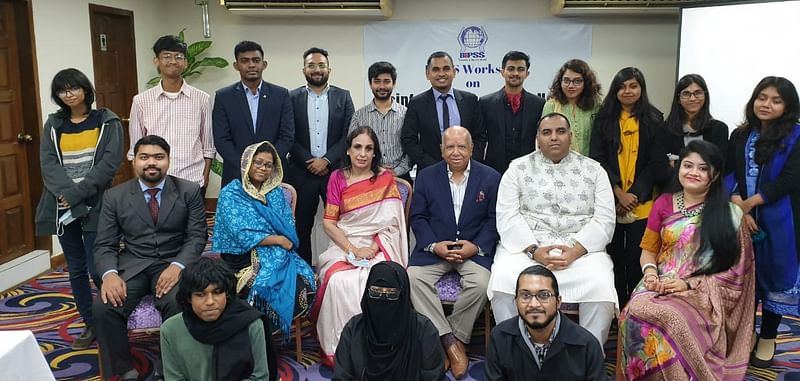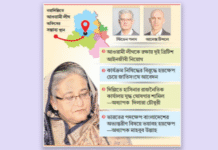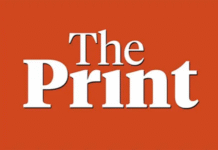
The basic rules of information have been changed by social media. It is a double-edged sword, that destabilises countries, societies and individuals. With fake news and disinformation now more rampant than ever on the scene, and made more sinister with ‘deep fake’, things have become dangerous, lethal.
These observations were made by retired major general ANM Muniruzzaman, president of the Bangladesh Institute of Peace and Security Studies (BIPSS), in his opening remarks at the BIPSS workshop on ‘Developing a Critical Understanding against Fake News and Disinformation,’ held on 22 December at a hotel in the capital city.
Attended by students, young professionals and youth from various sectors, the keynotes of the two sessions were presented by Ayesha Kabir, head of the Prothom Alo (English) news portal and Shafqat Munir, BIPSS Research Fellow and Head of the Bangladesh Centre for Terrorism Research (BCTR).
“As a media person,” she said, “There is always that temptation to stay ahead in the race for breaking news. But genuine news, verified news, is much more important that breaking news. Breaking news may give you the instant gratification of large ‘hits’ and ‘likes’, a surge in real-time readership, but in the long run it is the truth that triumphs. If breaking news proves to be fake, the damage is long term. Responsible media wins in the long run.”
Fake news is good news, Ayesha Kabir went on to say, explaining it was ‘good news’ for the mainstream media. “There was a time when mainstream media seemed to be losing ground, with the proliferation of information in the social media. But all too often, the innumerable juicy news flashes and information on the social media proved to be false and so people then started to turn back to mainstream media to verify the veracity of the reports.”
The rumour of Chinese contractors wanting human heads for Padma bridge is an example of just how dangerous fake news can be. It was not something to be sniggered at or dismissed as just another prank. It ballooned out of proportion, resulting in lynching and deaths. It is imperative for the media to take an extremely responsible role when it comes to news and also for the readers to develop their powers of discerning, she said.
Game spaces are now being used to peddle information. Seemingly innocuous game apps, certain quarters are using these spaces to disseminate information and make contact with their target groups
And the state has the utmost responsibility to thwart the onslaught of fake news, continued the Prothom Alo journalist. She said that the Digital Security Act, purportedly enacted to protect people from fake news, served a completely contrary purpose. It served to suppress any genuine news of public interest that exposed corruption, crime and misdeeds, particularly if was perpetrated by the powers that be.
BIPSS research fellow and head of the Bangladesh Centre for Terrorism Research, Shafqat Munir, began his keynote with a quote from Al Gore – Fake news has been around as long as news.
He pointed out that the COVID-19 outbreak had highlighted news challenges when it came to news and information.
He deliberated on the disinformation disorder, which has led to disinformation, misinformation and malinformation which is used to inflict harm.
“Social media is a key source of fake news in Bangladesh,” said Shafqat Munir, “because of the extremely high number of users. Dhaka has the highest number of Facebook users after Bangkok. Every minute 10 new users are opening Facebook accounts in Dhaka.”
He elaborated further on online users in the country, “Bangladesh has 91.2 million internet users and 157.2 million mobile connections.”
The problem was that terrorists’ skillfully uses the various apps for getting and disseminating information, he added when talking about trends in fake news.
“We need to adapt to new technology, embrace and adopt new technology, learning to discern and distinguish between right and wrong,” said Shafqat Munir. “The authority of the news sources must be questioned.”
Participants at the workshop brought up various issues pertaining to fake news, disinformation and suppression of the truth. Some pointed to the responsibility of the state and others also pointed to vested interests of several media owners which prevented free flow of information. Civil society also had a vital responsibility against fake news and to uphold freedom of expression and the truth, they noted.
Concluding the workshop, Maj. Gen. ANM Muniruzzaman pointed out that news cycles had changed dramatically, the rules of business had changed and it was difficult to keep pace. Alternative truth had entered and it was a New World in terms of information and news.
“We are living in an analogue world where everything is digital,” he observed.
He said pointed out how ‘game spaces’ had gained ground in recent times.
“Game spaces are now being used to peddle information. Seemingly innocuous game apps, certain quarters are using these spaces to disseminate information and make contact with their target groups,” he said.
The workshop concluded with certificates being handed out to the participants.









